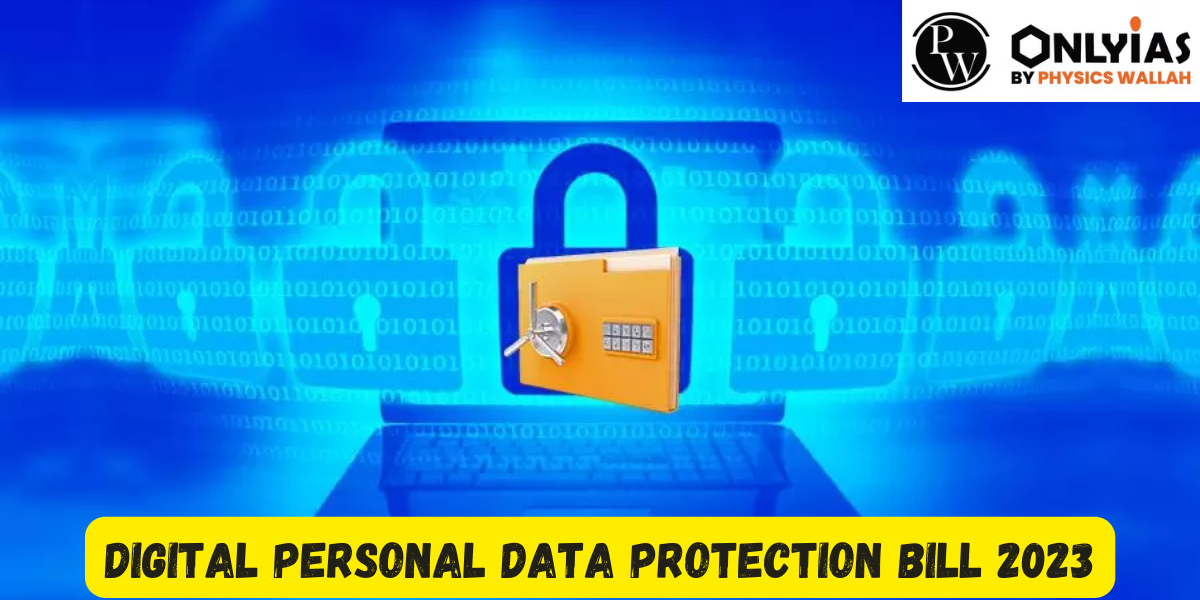Protect Your Digital Data! Understand India's new Bill: rights, obligations & impact on privacy. UPSC & Current Affairs essential.

Digital Personal Data Protection Bill 2023: The Digital Personal Data Protection Bill aims to regulate the processing of digital personal data in India. It applies to both online and offline data collection and processing, including activities outside India if they involve offering goods or services in India.

– Personal data can be processed only for lawful purposes with the individual’s consent, except for specified legitimate uses.
– Legitimate uses include voluntary data sharing, processing by the State for licenses and benefits, and medical emergencies.
– Consent is not required for government-provided benefits, and individuals below 18 need parental/guardian consent.
– Individuals (data principals) have rights to information, correction, erasure, and grievance redressal.
– Data fiduciaries must ensure data accuracy, security, and deletion when no longer needed.
– Personal data can be transferred outside India, except to countries restricted by the government.
– Exemptions apply to data processing by the State for national security and public order.
– The Data Protection Board of India is established to oversee compliance, impose penalties, and handle grievances.
– Board members serve a two-year term and can be re-appointed.
On August 3, 2023, the Indian Government introduced the Digital Personal Data Protection Bill, 2023 (DPDP Bill) in the Indian Parliament. This marks the fifth version of personal data protection legislation and appears to draw from the draft Bill titled Digital Personal Data Protection Bill, 2022, released by the Ministry of Electronics and Information Technology on November 18, 2022, which underwent public consultations. The DPDP Bill specifically addresses digital personal data and does not encompass non-personal data. Its enactment will replace Section 43A of the Information Technology Act, 2000 (IT Act), as well as the Information Technology (Reasonable Security Practices and Procedures and Sensitive Personal Data of Information) Rules, 2011 (SPDI Rules).

CURRENT STATUS of Digital Personal Data Protection Bill 2023: The DPDP Bill is currently before the Lok Sabha and awaits further consideration. After clearance by both Houses of Parliament and Presidential assent, it will become law.
The Digital Personal Data Protection Bill seeks to regulate digital personal data processing in India through consent-based principles. While it addresses important aspects of data protection, certain key issues and omissions warrant careful consideration to ensure effective and balanced data privacy regulations.

The legislation also permits the establishment of a Data Protection Board (DPB), responsible for offering corrective actions for reported instances of data breaches. Additionally, the Board is empowered to suggest the removal of content or the suspension of a digital intermediary for reasons of "public interest."
The DPDP bill has received approval from both chambers of the Rajya Sabha. It will now be forwarded to President Droupadi Murmu for her approval, after which it will be enacted as a law.
The DPDP Act brings forth comprehensive regulations pertaining to the responsibilities of providing notice and obtaining consent. It outlines acceptable scenarios for processing personal data without explicit consent under the category of 'legitimate uses'. Moreover, it sets up an 'Appellate Tribunal' to address grievances and places increased duties on data fiduciaries when managing personal data.
The DPDP Bill also empowers the establishment of an autonomous entity with primary responsibilities that encompass: (i) overseeing adherence to the DPDP Bill; (ii) levying sanctions; (iii) issuing directives to address and alleviate data breaches; (iv) investigating data breaches; and (v) addressing grievances through hearings.
<div class="new-fform">
</div>